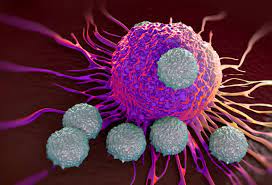
Diagnosed with Cancer? Your two greatest challenges are understanding cancer and understanding possible side effects from chemo and radiation. Knowledge is Power!
Learn about conventional, complementary, and integrative therapies.
Dealing with treatment side effects? Learn about evidence-based therapies to alleviate your symptoms.
Click the orange button to the right to learn more.
- You are here:
- Home »
- Blog »
- side effects ID and prevention »
- Melanoma, Immunotherapy, Side Effects, Serious Collateral Damage
Melanoma, Immunotherapy, Side Effects, Serious Collateral Damage

“These side effects can happen and, when they happen, they can be severe and lethal,” Ryan J. Sullivan, MD,
Living with incurable cancer since 1994 has taught me that conventional oncology understates the many side effects caused by chemotherapy and radiation. In fact, in many cases conventional oncology doesn’t call immunotherapy “chemotherapy” at all. Chemotherapy has gotten a bad rap over the years.
For the record, the definition of “chemotherapy” is treating cancer with a chemical therapy. Immunotherapy is definitely a type of chemotherapy. Immunotherapy causes serious short, long-term and late stage side effects.
My approach as always been about educating the cancer patient/caregiver. If the patient chooses to risk side effects then by all means, go for it. I am writing this post in order to educate melanoma patients and caregivers.
I don’t blame oncologists. Conventional oncology thinks more about treating cancer and less about living with or surviving cancer.
A good example stared me right in the face when I read the study linked below. Oncology talks about FDA approvals leading to “more durable responses among patients living with cancer.” The article talks about durable responses…
So when conventional oncology is suspicious of treating cancer…well, something has to be seriously wrong.
There is no question that immunotherapy can be a benefit to cancer patients. The purpose of this post is to highlight the risk/reward proposition, the pros and cons of immunotherapy to patients.
- To Learn More about the Harmful Effects of Immunotherapy- click now
- To Learn More about the pros and cons of immunotherapy- click now
I am a cancer survivor and cancer coach. Like all conventional therapies, there are evidence-based methods of reducing the risk of side effects. To learn more about these therapies scroll down the page, post a question or comment and I will reply to you ASAP.
Thank you,
David Emerson
- Cancer Survivor
- Cancer Coach
- Director PeopleBeatingCancer
Toxicities associated with immunotherapy warrant ‘very high level of suspicion’
“Since 2011, the FDA has approved six immune checkpoint inhibitors designed to reverse the course of multiple cancers.
Those approvals — along with oncologists’ willingness to combine immunotherapies — has led to more durable responses among patients with cancer…
However, many oncologists say the toxicities associated with immunotherapies, especially those used in combination, pose a greater risk to patients than often reported in clinical trials funded by the pharmaceutical companies that develop and distribute these drugs…
Toxicities from combination immunotherapy can range from skin rashes, mucositis and diarrhea to colitis, sepsis, hypothyroidism, hyperthyroidism, pneumonitis, myocarditis, arrhythmia, type 1 diabetes, and hypophysitis. These can occur within weeks after initiation…
“These side effects can happen and, when they happen, they can be severe and lethal,” Ryan J. Sullivan, MD,
Checkpoint inhibitors targeting cytotoxic T lymphocyte-associated antigen 4 (CTLA-4) and the programmed death-1 receptor (PD-1) and its ligand PD-L1 have become standards of care for an increasing number of indications, including:
- metastatic melanoma,
- non-small cell lung cancer,
- renal cell carcinoma,
- Hodgkin lymphoma,
- urothelial cell carcinoma and
- squamous cell carcinoma of the head and neck
FDA-approved checkpoint inhibitors include
- ipilimumab (Yervoy, Bristol-Myers Squibb),
- nivolumab (Opdivo, Bristol-Myers Squibb),
- pembrolizumab (Keytruda, Merck),
- atezolizumab (Tecentriq, Genentech),
- avelumab (Bavencio; EMD Serono, Pfizer) and
- durvalumab (Imfinzi, AstraZeneca).
In a separate study, also published in The New England Journal of Medicine, Johnson and colleagues reported that 40% of patients treated with advanced melanoma discontinued combination immunotherapy because of adverse events. The study — which used data from Bristol-Myers Squibb’s corporate safety databases — also showed only 18 of 20,594 patients (0.09%) receiving nivolumab alone or with ipilimumab experienced myocarditis — potentially fatal inflammation of the heart muscle. However, the incidence of myocarditis was higher among those assigned the combination than nivolumab alone (0.27% vs. 0.06%).
“But, I can tell you, in my practice, I had three patients last year who developed myocarditis out of about 100 treated,” said Puzanov, who also was an author on that study. “That’s still only 3%, but it’s well over 0.27%. If you are one of those three patients, it’s 100% for you.”
Study Details Long-Term Side Effects of Immune Checkpoint Inhibitors
“Immune checkpoint inhibitors are a type of immunotherapy used to treat many kinds of cancer. In some patients, these drugs can lead to long-lasting remissions. While doctors are familiar with the short-term side effects of these drugs, less is known about the possibility of long-term, or chronic, side effects. According to a new study, immune checkpoint inhibitors can cause a range of long-term side effects, most of them mild.
Immune checkpoint inhibitors like nivolumab (Opdivo) and pembrolizumab (Keytruda) take the brakes off of cancer-killing immune cells. But these activated immune cells can also harm healthy tissues, leading to side effects.
Most side effects of immune checkpoint inhibitors are short-lived (acute) and can be treated with steroid drugs. Until now, less was known about the frequency, timing, and spectrum of long-term side effects of these treatments.
The new study looked at real-world data on people with melanoma who were recently treated with an immune checkpoint inhibitor. The researchers focused on side effects that were caused by the immune system.
More than 40% of the patients developed a long-term immune-related side effect, the researchers reported March 25 in JAMA Oncology. Most of these side effects did not go away during the nearly 1.5 years that patients were tracked…”


